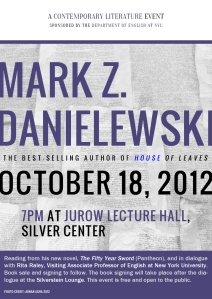check 2:15 mark
Only Revolutions infographic
David Ryan Andersson: Visualizing patterns in Mark Z. Danielewski’s Only Revolutions
Slate: MZD & e-books
From Slate, “The Ghost in the Machine” (December 3, 2012):
“…At the moment, e-book sales account for more than 20 percent of dollars that consumers spend on books. Almost all of that market share belongs to the “print mimic”-style e-books. But there’s also an emerging category called enhanced e-books—digital editions with special features like audio and video—that are more than just mimics. Or at least they can be, in the right hands.
…Enhanced e-books are rare in publishing because they’re expensive to produce, and the audience is, for the moment, pretty limited. (Some enhanced e-books, including The Fifty Year Sword, can be viewed only on an iPad.) “We’re finding that the effort behind these types of books is a magnitude of somewhere between seven and 15 times as much effort as a typical illustrated e-book,” said Liisa McCloy-Kelley, head of the digital production group at Random House (which owns Pantheon). To complicate matters, the differences among rapidly evolving platforms and formats make enhanced e-books difficult to market, even to tech-savvy consumers.”
New apps for Shakespeare
From the NY Times (Nov 30, 2012): “good cheer! It’s the 21st century, and modern technology has made wonderful advances in making Shakespeare’s plays and poems more accessible — even enticing — for an audience equipped with iPads and smartphones….”
Website launch for The Open Utopia
Wednesday, December 5, 2012
5:30PM – 7:30PM
20 Cooper Square, 5th Floor
Join Stephen Duncombe (Gallatin and MCC, NYU) and Bob Stein (Institute for the Future of the Book) for the launch of The Open Utopia, an open-source project based on Sir Thomas Moreʼs Utopia. Using the platform Social Book, users can add their own notes, criticisms, or anecdotes to the text which can be read by everyone. For more information, please visit: http://theopenutopia.org/. This is an NYU-DH (Digital Humanities @ NYU) event.
Read the recent Chronicle of Higher Education article about The Open Utopia and Social Book.
“What Should Children Read?”
From Sara Mosle, “What Should Children Read?” NY Times (November 22, 2012):
“What schools really need isn’t more nonfiction but better nonfiction, especially that which provides good models for student writing. Most students could use greater familiarity with what newspaper, magazine and book editors call “narrative nonfiction”: writing that tells a factual story, sometimes even a personal one, but also makes an argument and conveys information in vivid, effective ways.
What Tom Wolfe once said about New Journalism could be applied to most student writing. It benefits from intense reporting, immersion in a subject, imaginative scene setting, dialogue and telling details. These are the very skills most English teachers want students to develop. What’s odd is how rarely such literary nonfiction appears on English — or other class — reading lists. In addition to a biology textbook, for example, why can’t more high school students read “The Immortal Life of Henrietta Lacks”?”
Workshop presentation: Scalar
Workshop: An Overview of Multimodal Publishing (Tara McPherson)
Thursday, November 15, 12:30 PM
19 University Place, room 222
This brown-bag workshop will address practical and theoretical questions regarding approaches to multimodal scholarly publishing and focus in particular on Scalar. For DCI participants and others working in digital publishing, this promises to be a great opportunity to learn about combining textual, visual, and audio media in order to complicate and deepen the kind of questions their projects examine. As the editorial statement for the Vectors journal contends, multimodal projects exhibit the unique ability “to represent the multiple collaborations and conflicts that take place in interactive and computational media, highlighting not only the virtual dialogue between creator and producer, but also the tenuous alliance of human and machine intelligence.”
“Reading More but Learning Less?”
From the NY Times: “When one of the “big two” newsweeklies is going out of print, it’s clear that Americans are not consuming news the way they used to. Maybe that’s a good thing, if the technology revolution has made it easier to get more of the kind of information and analysis that readers once sought from Newsweek. But if Americans are finding a more polarized reality online, they may have just grown more partisan with less knowledge, making it more important for forums like presidential debates to deal with the details of policy.”
With posts from Cass Sunstein, Nicholas Carr, Eli Pariser, Denise Cheng, et al
SAT reading scores hit four-decade low
From the Washington Post: “SAT reading scores for graduating high school seniors this year reached a four-decade low as the number and diversity of students taking the college admissions tests hit an all-time high, the College Board reported Monday. The average reading score for the Class of 2012 was 496, down one point from the previous year and 34 points since 1972….In writing, the average score was 488, down nine points since that subject was first tested in 2006.”
